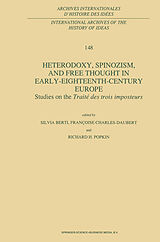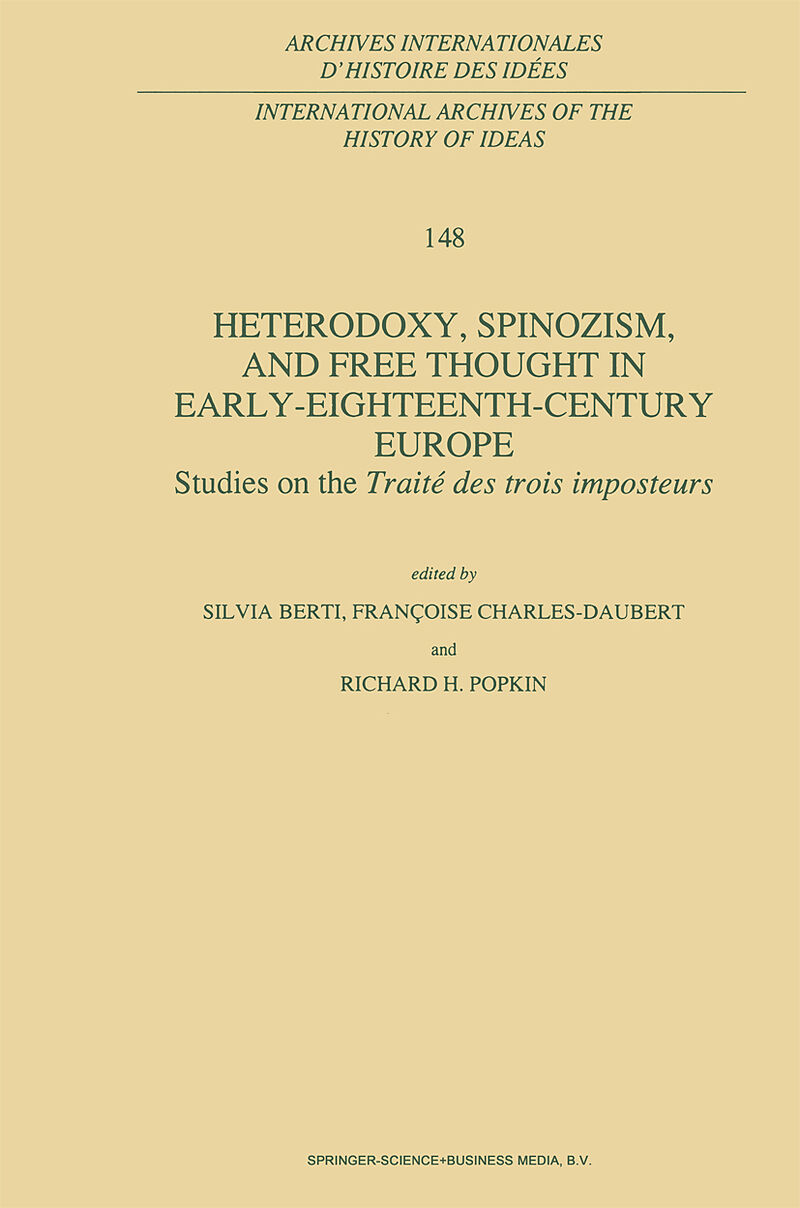Heterodoxy, Spinozism, and Free Thought in Early-Eighteenth-Century Europe
Einband:
Kartonierter Einband
EAN:
9789048147410
Untertitel:
Studies on the Traité des Trois Imposteurs
Herausgeber:
Springer Netherlands
Auflage:
Softcover reprint of hardcover 1st ed. 1996
Anzahl Seiten:
556
Erscheinungsdatum:
09.12.2010
ISBN:
9048147417
'the oldest biography of Spinoza', La Vie de Mr. Spinosa, which in the manuscript copies is often followed by L'Esprit de M. Spinosa. Margaret Jacob, in her Radical Enlightenment, contended that the Traite was written by a radical group of Freemasons in The Hague in the early eighteenth century. Silvia Berti has offered evidence it was written by Jan Vroesen. Various discussions in the early eighteenth century consider many possi ble authors from the Renaissance onwards to whom the work might be attributed. The Trois imposteurs has attracted quite a bit of recent attention as one of the most significant irreligious clandestine writings available in the Enlightenment, which is most important for understanding the develop ment of religious scepticism, radical deism, and even atheism in the seventeenth and eighteenth centuries. Scholars for the last couple of decades have been trying to assess when the work was actually written or compiled and by whom. In view of the widespread distribution of manu scripts of the work all over Europe, they have also been seeking to find out who was influenced by the work, and what it represented for its time. Hitherto unknown manuscripts are being turned up in public and private libraries all over Europe and the United States.
Klappentext
'the oldest biography of Spinoza', La Vie de Mr. Spinosa, which in the manuscript copies is often followed by L'Esprit de M. Spinosa. Margaret Jacob, in her Radical Enlightenment, contended that the Traite was written by a radical group of Freemasons in The Hague in the early eighteenth century. Silvia Berti has offered evidence it was written by Jan Vroesen. Various discussions in the early eighteenth century consider many possi ble authors from the Renaissance onwards to whom the work might be attributed. The Trois imposteurs has attracted quite a bit of recent attention as one of the most significant irreligious clandestine writings available in the Enlightenment, which is most important for understanding the develop ment of religious scepticism, radical deism, and even atheism in the seventeenth and eighteenth centuries. Scholars for the last couple of decades have been trying to assess when the work was actually written or compiled and by whom. In view of the widespread distribution of manu scripts of the work all over Europe, they have also been seeking to find out who was influenced by the work, and what it represented for its time. Hitherto unknown manuscripts are being turned up in public and private libraries all over Europe and the United States.
Inhalt
I. History and Interpretation of the 'Traité des Trois Imposteurs'.- 1. L'Esprit de Spinosa: ses origines et sa première édition dans leur contexte spinozien.- 2. Une Histoire interminable: origines et développement du Traité des trois imposteurs.- 3. History and structure of our Traité des trois imposteurs.- 4. L'Esprit de Spinosa et les Traités des trois imposteurs: rappel des différentes familles et de leurs principales caractéristiques.- II. Around the 'Traité'.- 5. Freethinking in early-eighteenth-century Protestant Germany: Peter Friedrich Arpe and the Traité des trois imposteurs.- 6. The English Deists and the Traité.- 7. Sallengre, La Monnoye, and the Traité des trois imposteurs.- 8. The politics of a publishing event: the Marchand milieu and The life and spirit of Spinoza of 1719.- 9. Impostors and Revolution: on the 'Philadelphie' 1796 edition of the Traité des trois imposteurs.- III. The Threads of a Tradition.- 10. An eighteenth-century interpretation of the Ethica: Henry de Boulainvilliers's 'Essai de métaphysique'.- 11. Legislators, impostors, and the politic origins of religion: English theories of 'imposture' from Stubbe to Toland.- 12. 'Behold the fear of the Lord': the Erastianism of Stillingfleet, Wolseley, and Tillotson.- 13. 'Jesus Nazarenus legislator': Adam Boreel's defence of Christianity.- 14. Johan Adler Salvius' Questions to Baruch de Castro concerning De tribus impostoribus.- 15. The struggle against unbelief in the Portuguese Jewish community of Amsterdam after Spinoza's excommunication.- 16. Worse than the three impostors? towards an interpretation of Theodor Ludwig Lau's Meditationes philosophicae de Deo, mundo, homine.

Leider konnten wir für diesen Artikel keine Preise ermitteln ...
billigbuch.ch sucht jetzt für Sie die besten Angebote ...
Die aktuellen Verkaufspreise von 6 Onlineshops werden in Realtime abgefragt.
Sie können das gewünschte Produkt anschliessend direkt beim Anbieter Ihrer Wahl bestellen.
Loading...
Die aktuellen Verkaufspreise von 6 Onlineshops werden in Realtime abgefragt.
Sie können das gewünschte Produkt anschliessend direkt beim Anbieter Ihrer Wahl bestellen.
| # | Onlineshop | Preis CHF | Versand CHF | Total CHF | ||
|---|---|---|---|---|---|---|
| 1 | Seller | 0.00 | 0.00 | 0.00 |
